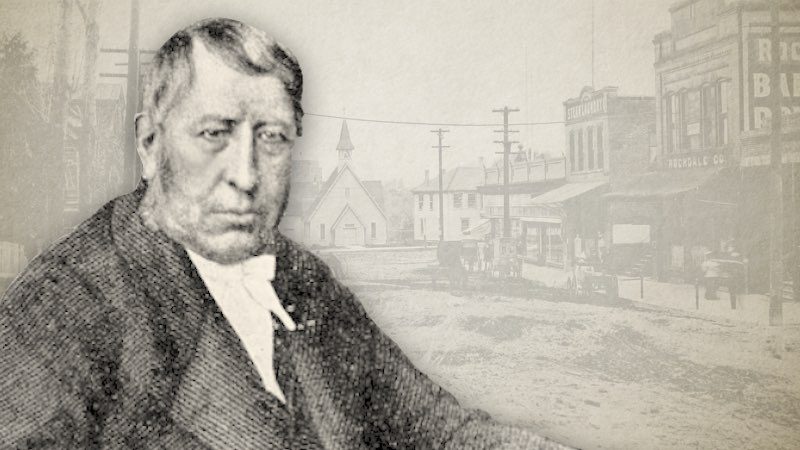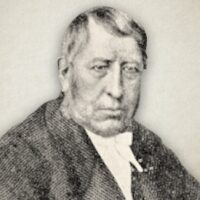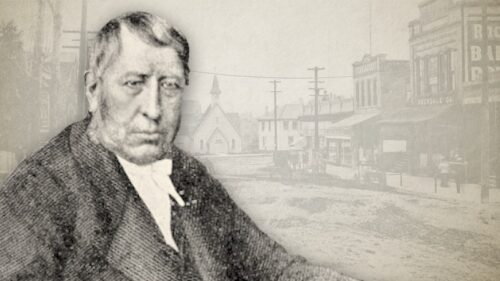
The Life And Testimony Of John Kershaw
Earthen Vessel 1892:
John Kershaw, Born August 25th, 1792. Died January 11th, 1870.
“The memory of the just is blessed.”—Proverbs 10:7
During the first half of the present century most of the Churches in the north of England were highly favoured with good and gifted men of truth as we gather from a collection of autograph letters and published works before us; and fifty years ago most of the London and suburban Churches were honoured with pastors whose labours God greatly owned and blest and whose names are still fragrant to many lovers of the Gospel. About the same time one of the foremost pastors in Lancashire was John Kershaw, a man greatly esteemed by all truth- loving people who knew him. He was born of humble, but very godly parents a century ago at Lower Fold, Healey, in the parish of Rochdale and county of Lancaster. Like boys in general, he loved to have his own way, and as he grew up be sought at every opportunity the company he most admired, and which led him astray to the great grief of his parents. In his autobiography he says, ”When I was a little boy, my father took me by the hand, and I went peaceably to the house of God; but as I grew up I began to feel a hatred to divine things. The chapel became like a prison to me. How wretched and miserable have I sat there, stopping my ears literally that I might not hear the sound of the minister’s voice, and shuffling on my seat through weariness of the service; and ae soon as the minister said ‘.Amen’ (which was the most welcome word tom in the whole service) and I ran as quickly as possible, and set off at full speed into the fields and adjoining woods to seek for my companions in sin.
“I was sometimes forbidden to go out on a Sunday evening, and compelled to stop within doors and read the Word of God. My father would also read aloud from some of his religious books, such as the works of John Newton and Hervey, and Erskine’s Gospel Sonnets which he was very fond of. As I sat and heard him read the latter, I often thought within myself that it was the most foolish of all books ever written. It contained, as I thought, nothing but a heap of contradictions: and what surprised me the most was, these very contradictions appeared the most pleasant and savoury to my father, such as his soul loved…On such occasions I was like a vicious horse, champing the bit, prancing with its feet, longing to be gone; for my heart was with my sinful companions. Not a parent in the village kept his children under the same religious discipline as my father did.” Erskine’s Gospel Sonnets (the Believer’s Riddle), which so delighted the heart of young Kershaw’s father are very quaint and pithy and of course not likely to prove attractive to a young lad. They are, nevertheless, full of meaning and sweetly spiritual. Here are two verses on the “Old and New Man”:—
” Temptations breed me much annoy,
Yet divers such I count my joy.
On earth I see confusions reel,
Yet wisdom ord’ring all things well.
I sleep, yet have a waking ear,
I’m blind and deaf, yet see and hear,
Dumb, yet cry, Abba, Father, plain,
Born only once, yet born again.”
In due course his conscience began to alarm him in consequence of his disobedience to his parents, Sabbath-breaking, &c. He could not join his old companions in their foolish conversation as he had done, and hence a moral change had taken place in him. “But,” he says, “The set time to favor Zion was come. I was walking alone on the footpath in the field next to the chapel when the Lord arrested me. There came such a power and solemnity upon my mind as overwhelmed me. I stood trembling and burst into a flood of tears. I felt the powerful hand of God had laid fast hold of my poor soul. Death, the day of judgment, and the realities of a vast and awful eternity oppressed my thoughts and harrowed up my feelings in a manner I can never describe. As I stood thus distressed, I saw others coming to the chapel, and went aside into the graveyard to dry up my tears before I entered the place; but I could not, so I entered, hanging down my head, and covering my face with my pocket-handkerchief, which prevented my father and others near me seeing that I was overwhelmed in tears. I tried to get rid of the feeling, but could not: the arrows of the Lord stuck fast in me, and His hand pressed me sore.”
About the same time he became greatly affected in mind through the death of one of his companions, and attended chapel regularly, read his Bible, also Banyan’s “Heavenly Footman,” which a friend had lent him; thus he was regarded as a thoroughly changed young man. He says, “I had set up for a most zealous professor of religion, and people began to notice my conduct, and to express their admiration of the great change there was in me. I well remember hearing my mother and two neighbour women in conversation concerning me, when my mother told them the great trouble I had given my father in refusing to go with him to chapel, but such a change had taken place that I had forsaken all my old companions and ways, and was never so happy as when I was in company with old men, and going with them to the chapel and to prayer-meetings,” and, to use his own words, “I became full of religion.” He, however, knew little of the hidden evils of his own heart as he was afterwards led to experience. He attended the various meetings for worship in the neighbourhood and heard Stedman, of Bradford; Fawcett of Hebden Bridge; Roby, of Manchester, and others. At one of the meetings for reading the Scriptures and prayer he heard “a plain, simple, honest-hearted old Christian “read and expound Matt. 6 which cut to pieces all his supposed goodness.
“When he began,” says Kershaw, ”it was as though he had said to me, ‘I am going to describe what thy religion is; to wit, the religion here spoken of, which is that of the Scribes and Pharisees, who make long prayers, use vain repetitions, and love to be heard for their much speaking.’” “These,” he said, “were looking to their own goodness as the ground of their acceptance with God.” This is where it cut me the most keenly, as I was for saving and helping myself. In summing up,” he said. “Christ pronounced more woe, and curses against such characters than He did against the openly profane, such as whoremongers, adulterers, swearers, Sabbath-breakers, and the like; and that publicans and harlots were nearer the kingdom of heaven than these.” This poor illiterate man’s commentary on the chapter did more to pull down my self-righteousness than all the preaching I had heard that week…As I went home I reasoned thus with myself: ‘Well, I have done the best I can; and if being good, and doing good, going to chapel and serving the Lord will not do, I cannot tell what will…I will even give it all up at once for lost, and if I am doomed to everlasting destruction, I will go like other folks, and just take my fling at sin.'”
The following morning he resolved to go to Manchester races, and started off without his breakfast, and with only fourpence in his pocket. On the way he met with a companion, who accompanied him; when they reached Middleton they called at a public-house for beer, which was the first time young Kershaw ever entered such a place. He says, “I was so young that I felt ashamed, and no doubt looked bashful enough as I did it. As we sat in the room near the window a coach came to the door. On the dickey sat Mr. Davis, Baptist minister at Byron-street chapel, Liverpool. He had sat in the pulpit the day before during the time Stedman and Fawcett preached. The sight of him was like a dagger to my heart. As I looked at him I said to myself, ‘He is a good man…in the right way to heaven. As for me it is all over. My case is desperate. I am out of the secret. I have sought for the right way, but cannot find it.’ Such was the state of my mind, I was sorely put to it whether to go back, or go forward.” He went to the races, but was so wretched that he saw nothing to attract his attention, and on returning home, after walking upwards of twenty miles, he felt weary, worn, and sad at heart, and thoroughly ashamed of himself. The Lord, however, shortly afterwards, broke the snare, and as he says, “I felt in my inmost soul that I had for ever done with such ungodly sports, and bade them a final adieu; so, weaned from them, I could say with Dr. Watts:—
“My soul forsakes her vain delight,
And bids the world farewell,
Base as the dirt beneath my feet,
And mischievous as hell.
No longer will I ask your love,
Nor seek your friendship more;
The happiness that I approve
Is not within your power.”
He was finally brought into Gospel liberty at Bacup, under a sermon preached by Mr. Hurst from the following words, ”Look unto Me, and be ye saved, all the ends of the earth, for I am God, and there is none else” (Isa. 14:22); and was then favoured to know the truth experimentally, as he observes, “My soul now began to hunger and thirst after Christ and His finished free-grace salvation. I read my Bible as with new eyes, and heard preaching as with new ears.” He was much helped in spiritual things by the ministrations of Mr. Roby, of Manchester; Mr. Littlewood, of Rochdale; Mr. Gadsby, of Manchester; and by reading Elisha Coles on “Divine Sovereignty,” and was baptized with several others, in a reservoir in an open field, by William Gadsby, in the presence of nearly 2,000 persons, on May 24th, 1809.
His call to the work of the ministry, settlement as pastor at Rochdale, jubilee, death, burial, &c., are faithfully recorded in his autobiography, which is still in print. On page 400 occurs the following inscription from a tablet erected to his memory in the chapel where be so long and successfully laboured:—
“Erected by the members and friends worshipping at Hope Chapel, in remembrance of their beloved pastor, John Kershaw, who entered his eternal rest, January 11th, 1870, in the 78th year of his age, and the 53rd of his pastorate here; and was interred in the Rochdale Cemetery, January 17th. ‘A sinner saved by grace.’ ‘Blessed are the dead which die in the Lord.’—Rev. 19:13.”
May the Lord graciously raise up a host of such men as John Kershaw in our midst, as many of our Churches today are in great need of savoury and intelligent preachers of the truth.
W. Winters, Editor
Waltham Abbey, Essex
John Kershaw (1792-1870) was a Strict and Particular Baptist preacher. He was appointed the Pastor of Hope Chapel, Rochdale, serving this position for fifty-three years. John Hazelton wrote of him:
“His autobiography is one of the best books of its kind and one striking incident we will quote. It is his account of his interview in Edinburgh with Dr. John Duncan, often called "Rabbi" Duncan, because of his profound knowledge of Hebrew. Dr. Duncan (1796-1870) was Professor of Hebrew in New College, Edinburgh, and was a man of the most acute and profound intellectual powers, and at the same time a deeply spiritual and Scriptural preacher. In learning and associations he was at the antipodes of plain John Kershaw. In November, 1861, Mr. Kershaw preached in Edinburgh, arrangements having been made through Lady Lucy Smith, who was desirous that his original and powerful ministry should be exercised there. He writes:—"Another of my visitors was Dr. Duncan, who I was told by one of the ministers understood fourteen languages and that there was only one in the City who surpassed him in learning. He told me he had heard me preach three sermons, and he quite agreed with me in every statement that I had made, both in doctrine, experience and practice, save one, and that I had not fully entered upon, namely, 'the extent of the call of the gospel.' He candidly told me that his human learning had for years past been a great hindrance to his coming to a saving knowledge of the truth, and he had proved Paul's words, that the world by wisdom knew not God; and referring me to 1 Cor. 1:21,22 said he was for a long time like a wandering star or a ship at sea without a compass, ready to settle in every 'ism'—sometimes Arianism or Socinianism; and sometimes his mind was bordering upon infidelity. He declared himself much ashamed of many of his theological productions. When it pleased the Lord to work in his soul by the power of the Spirit he was for a long time in a distressed state, not knowing what to do to get peace and comfort. A conversation with another minister was made useful to him and he was enabled to go to the feet of Jesus as a little child and beg Him to teach him, a poor ignorant sinner, by His Spirit and His Word. The Lord graciously heard prayer and revealed Himself as his Saviour and Redeemer. We spoke of Scott's 'Force of Truth,' in which the author confessed he had been priding himself on his human attainments, opposing the doctrines of grace, and despising his neighbour, that dear man of God, John Newton, who eventually was made a blessing to him; also of John Berridge, who preached some years before the Lord stripped him and caused him to flee to Jesus for refuge. The conversation I had with this man I hope never to forget."
John Kershaw Sermons




